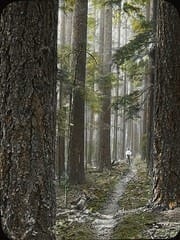It is afternoon in a hardwood forest on the edge of the Cumberland Plateau, and the cicadas are singing.
David Haskell, an ecologist and evolutionary biologist at the University of the South, is taking me through part of the 13,000 acres owned by the university, to a small circle of forest floor a bit over a yard in diameter. He visited this randomly chosen forest “mandala,” as he calls it, many times over the course of a year and recorded his observations in “The Forest Unseen: A Year’s Watch in Nature.”
He is pointing out flowers, salamanders, insects, trees, as we follow a well-worn hiking path, and stops for a moment to listen. These are swamp cicadas, he says, not the kind that hatch all at once after years underground and hammer the ear mercilessly.
“Was it last year or the year before we had the 13-year cicadas?” he says. “I took my sound pressure meter down to a place where they were really loud, and it came to over 90 decibels. At 85 OSHA says you need hearing protection in your workplace.
“Everybody else hates them.”
But to him, the noise is biological alchemy, sunlight into sound. “These guys have been feeding on roots for 13 years. And so it’s 13 years of combined Tennessee forest productivity being blasted out.”
It is this kind of perception, halfway between metaphor and field note, that makes his voice a welcome entry in the world of nature writers. He thinks like a biologist, writes like a poet, and gives the natural world the kind of open-minded attention one expects from a Zen monk rather than a hypothesis-driven scientist. He avoids terms like “nature deficit disorder” and refuses to scold the bug-fearing masses. His pitch is more old-fashioned, grounded in aesthetics as much as science.
“You can live a perfectly happy life never having heard of Shakespeare,” he says, “but your life is in some ways a little diminished, because there’s such beauty there.
“And I think the same is true of nature. Much of it is useless to us, and that’s O.K. It’s not true that every species that goes extinct is like another rivet off the plane and the plane’s going to crash. We lost the passenger pigeon and the U.S. economy did not tank. But we lost the passenger pigeon and we lost some of this remarkable music made out of atoms and DNA.”
Dr. Haskell wanted to tell the story of forest ecology and also to refresh himself with a kind of natural history meditation, as opposed to goal-directed scientific research. He has a daily practice of sitting and concentrating on his breathing (he doesn’t use the word “meditation”) of no specific religious bent. He does, however, set himself apart from crusading atheists, like Richard Dawkins, saying he harbors a “deep suspicion that the world is more than atoms rearranging themselves.”
He did no experiments and no research at his forest circle. He sat, and watched, and listened.
via The New York Times – The Latest Streaming News: Harmony with nature updated minute-by-minute
Bookmark this page and come back often
Latest NEWS
Latest VIDEO








